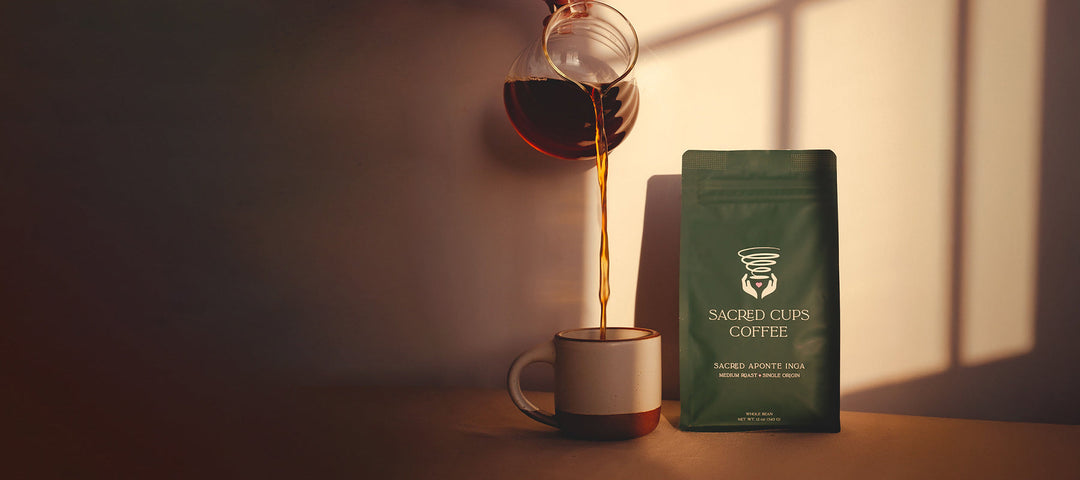
By Deanna Minich, PhD
Having had sensitive skin all my life, I’ve been on the hunt for that special cream or that magical elixir that would help me to ward off the redness, breakouts, hives, and growths that would occasionally appear. What I’ve come to know in my pursuit of glowing skin is that it’s an inside job: I eat a rainbow of plant-based foods every day, ensure I get the proper balance of fats, and supplement with various nutrients to help with detoxification of harmful compounds.More recently, I learned that coffee could add to my routine of healthy skin. In fact, a study was just published (1) in a dermatology-related article showing that Japanese women between the ages of 30 and 60 years old who drank coffee had significantly less pigmented spots, a marker of skin aging. Drinking green tea also had a significant effect, although not as great as that from coffee.
Of course, there are many factors which go into skin aging like UV exposure and smoking, but the researchers concluded that the skin was protected from aging due to plant compounds in the coffee and tea, specifically the polyphenols. Polyphenols are phytochemicals (e.g., flavonoids, lignans, phenolic acids) found throughout the plant kingdom in vegetables, fruits, grains, coffee, tea, and wine (2). They can modify the gut microbiome (note the gut-skin connection) (3) and protect against oxidative stress, DNA damage, and even UV radiation-induced inflammation (4).
You might imagine that not all coffees will provide the same amount of polyphenols all the time. Quality standards are different in various countries. It will depend on the bean, where it is grown and harvested and how it is roasted. The only way to know is to select coffee tested for one of its most potent polyphenols, chlorogenic acid.
“The beneficial compounds for skin health come from the fact that coffee can be a rich source of polyphenols. It is important to understand though that the amount of polyphenols in coffee vary greatly. How many you have in your cup directly relates to the region, altitude, quality, roasting and freshness. Every decision taken from the farm to the cup alters the polyphenols that are delivered. Find an organic coffee tested to be high in polyphenols.”–Andrew Salisbury, Purity Coffee Founder & CEO
It’s exciting to think that coffee can be a delivery source for these precious polyphenols, which can benefit our health on several levels, even the largest organ of the body, our skin. Stay tuned for more evidence-based blogs featuring research on other skin issues (e.g., rosacea, melanoma) and the role of coffee! 
Coffee's Role in Protecting and Enhancing Your Skin
Compounds in coffee have the same qualities that are used in many beauty products, especially antioxidants. Beauty products, particularly the organic ones, often cross over with today’s most popular superfoods like açaí and even blueberries. But over the past few decades, thousands of studies have discovered the benefits of multiple coffee compounds--including protecting and enhancing your body’s largest organ: your skin. Coffee naturally delivers almost a dozen antioxidants that contribute to human health, its greatest asset being chlorogenic acids (CGAs). But there are multiple other compounds present in coffee that can act as anti-cancer, antioxidant, and anti-aging compounds (all “anti’s” that are vital for skin health). These good compounds include of course CGAs, but also caffeine, caffeic acid, eugenol, gamma-tocopherol, isoeugenol, p-coumaric acid, scopoletin and tannic acid.
What Are Antioxidants?
Antioxidants are compounds that protect cells from the damage of free radicals. There is a very large body of research that explores how different antioxidants can help prevent a range of human disease, including cancer, atherosclerosis, stroke, rheumatoid arthritis, neurodegeneration, and diabetes. Newer evidence continues to find more and more positive effects of antioxidants in our bodies, including those that help keep our skin looking taut and healthy. Antioxidants not only promote the health of everything on the inside of our bodies, but they also play a key role in promoting positive skin health and appearance. Antioxidants fight premature aging, devouring the free radicals that damage the lipids that make your skin plump and wrinkle free. They also are potent anti-inflammatories that repair the damage of oxidative stress on your cells. If you’ve ever suffered with acne, you know how damaging skin inflammation can be for beauty and wellbeing.
The Key Components in Coffee that Promote Healthy Skin
Here, we explore the ways in which five components found in coffee promote skin health, both when ingested and when applied to the skin.
1. Caffeine

Caffeine is the most famous of the components in coffee, to the point that a lot of people conflate the two. It’s a (legal) psychoactive compound that wakes us up in the morning, and can contributes to mental acuity. It’s even been proven to aid in the prevention of neurodegenerative diseases like Alzheimer’s.
However, caffeine may stop DNA cell damage in its tracks by inhibiting the enzymes ATM and ATR. These are compounds that contribute to the growth of damaged cells, a process that can lead to cancerous tumors growing.
Caffeine’s inhibitory powers act as an anti-cancer agent, making tumors stop growing and becoming more sensitive to radiation therapy. But its ability to prevent cell proliferation also has an added beauty benefit. The growth of extra cells can lead to dead skin and skin cell damage, and so ingesting coffee can help fight these effects. By extension, the DNA repairing effects of caffeine definitely help to fight the development of skin cancer.
Caffeine also promotes good circulation, which keeps your complexion glowing.
2. Caffeic acid and ferulic acid

We’re reminded time and time again to apply sunscreen in order to protect the skin from the sun’s UVA and UVB rays. Skin damage caused by UV radiation leads to uneven skin tone, sunburn, premature aging, and even skin cancer.
Caffeic acid is what is called a plant hydrocinnamic acid, which is known to have powerful antioxidant activity. A study was carried out to determine if caffeic acid, together with ferulic acid, could help prevent damage caused by UV radiation from the sun when applied topically. The combination of these acids specifically scavenge a free radical called nitric oxide, which (true to its name) causes negative oxidative responses in the skin.
It was found that the combination of the two antioxidants, when applied, penetrated multiple layers of skin to protect every level that’s vulnerable to UV ray damage. Thus, the study concluded that caffeic and ferulic acid are extremely effective topical treatments for treating sun damage and preventing it in the first place.
3. Flavonoids
By now you might be thinking of how weird it is to put coffee straight on to your skin. Though it might sound strange at first, applying coffee topically is actually growing in popularity, particularly in natural beauty circles. It could catch on in mainstream culture as well, because big cosmetic companies are starting to tout the benefits of compounds like flavonoids. L’Oreal emphasizes how the antioxidant effects of flavonoids can help protect the skin from the environmental damage that creates free radicals like air pollution and sun damage.
The anti-inflammatory effects of flavonoids do a lot to help the body when you drink coffee. But according to an Oregon State University study, they really do work specifically for skin health when they’re applied directly to your face. The compounds’ qualities are changed when our bodies metabolize it, so their healthy qualities are more available to the skin when directly applied. Some of their greatest qualities are anti-inflammatory and photoprotective. That means they can both protect against sunburns and also treat them after you accidentally fall asleep in your beach chair.
4. Eugenol
Since skin cancer is generally curable, it sometimes is forgotten as a very real threat. But skin cancer can be deadly. Melanoma is the most dangerous type of skin cancer because it proliferates fast. It is must be caught early and receive appropriate treatment to be curable. Because many people don’t get checked out in time, melanoma unfortunately kills over 10,000 people in the United States every year.
A promising element of future treatment of skin cancer is eugenol. Eugenol is an antioxidant found in many aromatic spices like nutmeg and cinnamon, as well as plants like basil, bay leaves, and of course coffee. And unlike flavonoids, the healing effects of eugenol typically manifest when you ingest it rather than apply it to your skin. However, when distilled into an oil, some people may find that it helps reduce the effects of acne (though in some people it can actually cause breakouts--so be careful!).
Eugenol has a wide range of applications, due to its properties as an antiseptic, antioxidant, antimutagenic to combat osteosarcoma and leukemia, among other cancers. Skin cancer is no exception, as eugenol has been proven to not only help prevent, but also reduce the size of melanoma tumors once they appear.
5. Gamma-tocopherol

The gamma-tocopherol found in our diets, and particularly in coffee, make up about 70% of the vitamin E intake in the American diet. Vitamin E is one of the most important antioxidant vitamins that contributes to healthy skin. That antioxidant effect also contributes to the health of lipids in the skin. Lipids are what keep skin elastic and smooth and prevents premature aging and wrinkles. It helps fight the free-radical nitric oxide, preventing the premature aging that’s tied to oxidative stress.
While UVA rays and air pollution contribute to oxidative stress, UVB radiation is one of the most insidious contributors to skin damage. In fact, it’s proven to be the most carcinogenic component of sunlight. While drinking coffee does help fight the results of sun damage, topical applications can prove to be helpful (again) also.
Researchers made a topical, water-soluble cream containing gamma tocopherol to see if it could protect against UV-skin damage. Results found that whether the solution was applied before or after being in the sun exposed to UV-irradiation, it was found to have anti-inflammatory, antioxidant, and anti-pigmentation effects to help prevent sunburn, and thus skin damage as well.
With the exception of very few people, coffee’s benefits far outweigh its risk. It has antioxidant, anti-cancer, and anti-inflammatory functions that fight disease inside and out.
Overall, antioxidant content is the most effective component of coffee. It’s important to focus on boosting the healthy effects of coffee to help your skin and the rest of your body. Purity Coffee, the only coffee created with health as the top priority, is one of the most effective and pleasurable ways to get your daily dose of antioxidants.
Keep in mind that there are dozens of types of antioxidants and compounds that have different purposes and functions in the human body. We’ve only examined a few of those most commonly found in coffee and their relationship to skin health. Just these five compounds show that when ingested and used topically, coffee can prevent sunburn, soothe sunburn, scavenge the free radicals that increase dead skin cells and premature aging, and plump up your skin’s lipids. You may feel so confident in your youthful looks that you go out without any makeup at all!
Best of all, the more coffee you drink, the more benefits you will experience!
Drinking 3-5 cups of coffee a day is found to have the most benefits. And if you’re caffeine sensitive and don’t want to drink that many, Purity Coffee has the most antioxidant bang for your buck. Even with just a cup or two, you can get more than twice the antioxidants of drinking the same amount of your typical cup of coffee.
You might know that coffee has anti-cancer properties. You might have heard that it promotes overall longevity. You may even have heard about how it can help you lose weight. Well, now you can also add to that list how it can lead to healthier skin!
Have we been underestimating all the healthy effects that coffee can have on our skin? Could it be considered a new part of a daily beauty regimen?
References:
- Fukushima Y, Takahashi Y, Kishimoto Y, et al. Consumption of Polyphenols in Coffee and Green Tea Alleviates Skin Photoaging in Healthy Japanese Women. Clin Cosmet Investig Dermatol. 2020;13:165–172. Published 2020 Feb 10. doi:10.2147/CCID.S225043
- Yang, Q.; Liang, Q.; Balakrishnan, B.; Belobrajdic, D.P.; Feng, Q.-J.; Zhang, W. Role of Dietary Nutrients in the Modulation of Gut Microbiota: A Narrative Review. Nutrients 2020, 12, 381.
- Yang, Q.; Liang, Q.; Balakrishnan, B.; Belobrajdic, D.P.; Feng, Q.-J.; Zhang, W. Role of Dietary Nutrients in the Modulation of Gut Microbiota: A Narrative Review. Nutrients 2020, 12, 381.
- Nichols JA, Katiyar SK. Skin photoprotection by natural polyphenols: anti-inflammatory, antioxidant and DNA repair mechanisms. Arch Dermatol Res. 2010;302(2):71–83. doi:10.1007/s00403-009-1001-3
1 comment








Super interesting post!
Leave a comment